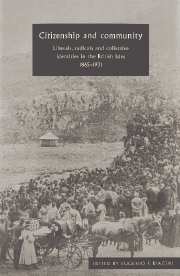 Citizenship and Community
Citizenship and Community Book contents
- Frontmatter
- Contents
- List of contributors
- Acknowledgements
- Introduction: Citizenship, liberty and community
- Part I Citizenship, populism and liberalism
- Part II Economic democracy and the ‘moral economy’ of free trade
- Part III Democracy, organicism and the challenge of nationalism
- 10 Land, religion and community: the Liberal Party in Ulster, 1868–1885
- 11 Nationalising the ideal: Labour and nationalism in Ireland, 1909–1923
- 12 Land, people and nation: historicist voices in the Highland land campaign, c. 1850–1883
- 13 The Welsh radical tradition and the ideal of a democratic popular culture
- Part IV Consciousness and society: the ‘peculiarities of the British’?
- Index
13 - The Welsh radical tradition and the ideal of a democratic popular culture
Published online by Cambridge University Press: 16 September 2009
- Frontmatter
- Contents
- List of contributors
- Acknowledgements
- Introduction: Citizenship, liberty and community
- Part I Citizenship, populism and liberalism
- Part II Economic democracy and the ‘moral economy’ of free trade
- Part III Democracy, organicism and the challenge of nationalism
- 10 Land, religion and community: the Liberal Party in Ulster, 1868–1885
- 11 Nationalising the ideal: Labour and nationalism in Ireland, 1909–1923
- 12 Land, people and nation: historicist voices in the Highland land campaign, c. 1850–1883
- 13 The Welsh radical tradition and the ideal of a democratic popular culture
- Part IV Consciousness and society: the ‘peculiarities of the British’?
- Index
Summary
Most accounts of Welsh radicalism in the late Victorian and Edwardian eras tend to stress the extent to which it was still wedded, albeit with declining fervour, to the shibboleths of popular liberalism: land reform, disestablishment and temperance. It was a political tradition that was unwilling, or unable, to address the changing problems and politics of urban and industrial south Wales, a political environment increasingly marked by class conflict and a widening chasm between the interests of capital and labour. Labour was seen by most Welsh Liberals as something to be either confronted or contained, not embraced as part of a fundamental re-evaluation of the values and objectives of radical politics. Lib–Labism is portrayed as offering a prolix ‘progressivism’ which hardly made up in the sheer volume of its wordy good intentions what it lacked in substance, namely policies to tackle the social ills of urban and industrial Wales. Into this intellectual vacuum intruded various brands of ethical and ‘scientific’ (i.e. Marxian) socialism. In an amazingly short period of time the enemies of the people ceased to be the landlords, the Anglican clergy and the brewers. They were replaced by the coalowners and their hired lackeys, the managers, collectively defined as the ‘bosses’.
It was a conceptual rupture so profound that within less than fifteen years the lay-preacher leadership of the South Wales Miners’ Federation (SWMF), the great embodiment of Welsh working-class social, economic and political independence, had been replaced by card-carrying communists. Even more important was the creation of an independent political labour movement which articulated its objectives by means of a socialist vocabulary and an anti-capitalist rhetoric.
- Type
- Chapter
- Information
- Citizenship and CommunityLiberals, Radicals and Collective Identities in the British Isles, 1865–1931, pp. 325 - 340Publisher: Cambridge University PressPrint publication year: 1996
- 1
- Cited by
